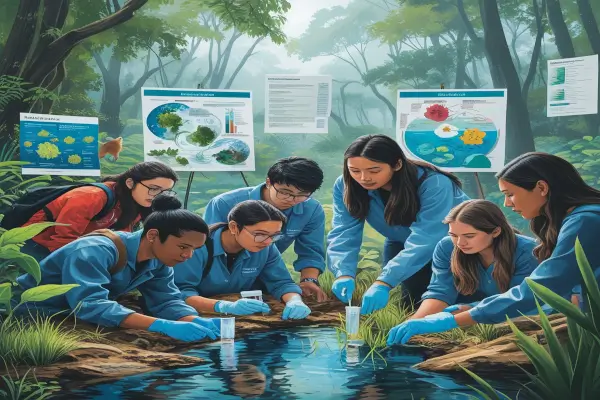As the world faces increasingly complex environmental challenges, the demand for professionals who can understand, manage, and solve environmental issues has never been higher. Biology majors with a focus on environmental science and conservation play a critical role in addressing problems like climate change, pollution, and biodiversity loss. If you’re passionate about both biology and the environment, choosing the right biology major can lead to a rewarding career in the environmental sector. This guide will help you explore which biology majors offer the best job opportunities in the field.
The Growing Importance of Environmental Careers
Environmental concerns are becoming more urgent due to the rapid pace of climate change, environmental degradation, and the depletion of natural resources. As a result, many industries, governments, and nonprofit organizations are looking for skilled biologists to help monitor, manage, and protect natural ecosystems. Careers in the environmental sector are diverse and offer the opportunity to work in areas such as wildlife conservation, environmental policy, ecological restoration, and sustainability.
Biology majors with an environmental focus are in high demand as they provide essential knowledge for solving environmental issues, whether through research, policy advocacy, or practical fieldwork. Let’s take a look at some of the best biology majors for entering the environmental sector.
Top Biology Majors for Environmental Careers
1. Environmental Biology
Environmental biology is the study of how living organisms interact with their environments, focusing on ecosystems, biodiversity, and conservation. This major is ideal for students who want to work in conservation science or wildlife management. Environmental biology majors study topics like environmental pollution, habitat destruction, and the impacts of climate change on biodiversity.
Key Skills: Ecosystem analysis, biodiversity conservation, environmental monitoring, ecological research
Job Opportunities: Conservation biologist, wildlife manager, environmental consultant, environmental educator
2. Ecology
Ecology focuses on the relationships between organisms and their environments, including how ecosystems function and how species interact with each other. Ecology majors often work in research, environmental consultancy, and policy development. This field is ideal for students who enjoy fieldwork and research in natural settings.
Key Skills: Field research, species interaction, habitat restoration, environmental data analysis
Job Opportunities: Ecologist, conservation scientist, restoration ecologist, environmental policy advisor
3. Marine Biology
Marine biology focuses on the study of ocean ecosystems and the organisms that live within them. With the increasing importance of ocean health in global climate discussions, marine biology majors are essential in addressing marine pollution, coral reef conservation, and the impacts of climate change on marine life. Marine biologists work in both research and applied environmental fields, often collaborating with conservation organizations and government agencies.
Key Skills: Marine ecology, oceanography, aquatic conservation, environmental monitoring
Job Opportunities: Marine biologist, oceanographer, marine conservationist, fisheries scientist
4. Environmental Science
Environmental science is an interdisciplinary major that integrates biology, chemistry, physics, and earth science to understand environmental issues. It is broader than environmental biology but still closely related to studying how human activity impacts the environment. Environmental science majors typically work in environmental monitoring, consulting, and policy advocacy, helping businesses and governments develop sustainable practices.
Key Skills: Environmental policy, sustainability strategies, pollution management, environmental impact assessments
Job Opportunities: Environmental consultant, environmental health and safety officer, sustainability analyst, policy advocate
5. Conservation Biology
Conservation biology focuses on the preservation of biodiversity and the management of endangered species. This major is ideal for students who want to work in wildlife conservation or habitat restoration. Conservation biologists assess ecosystems and species populations, developing strategies to protect and restore natural habitats.
Key Skills: Species conservation, ecological restoration, habitat management, environmental education
Job Opportunities: Conservation biologist, park ranger, wildlife rehabilitation specialist, environmental educator
6. Forestry and Environmental Management
Forestry and environmental management majors study the sustainable use of forest resources and the management of forest ecosystems. This major is perfect for students interested in the intersection of biology and land management. Forestry professionals work to maintain forest health, biodiversity, and sustainability in both urban and rural environments.
Key Skills: Forest ecology, land management, sustainable forestry, wildlife management
Job Opportunities: Forester, land manager, forest conservationist, natural resource manager
How to Choose the Right Biology Major for You
When deciding which biology major to pursue for a career in the environmental sector, consider your personal interests and career goals. Each of these majors has its own unique focus, and the right choice depends on what aspects of environmental work you’re most passionate about.
- Do you prefer hands-on fieldwork and working with wildlife? If so, environmental biology or marine biology might be the best fit for you.
- Are you interested in researching and managing ecosystems on a larger scale? Ecology and conservation biology would be strong options.
- Are you drawn to policy and sustainability work? Environmental science and forestry may offer the best career opportunities in those areas.
Consider also the job market and career prospects in your region. Some areas may have more opportunities for marine biologists, while others may have a stronger demand for conservation scientists or environmental consultants.
Building Experience and Networking
Regardless of your chosen major, gaining practical experience in the environmental sector will be key to landing a job after graduation. Look for internships, volunteer opportunities, or field research projects related to your area of interest. Many environmental organizations, government agencies, and NGOs offer internships that provide hands-on experience in conservation, research, and policy work.
Networking with professionals in the environmental field is also crucial for building connections and finding job opportunities. Attend conferences, participate in environmental clubs, and join relevant online forums or professional associations to stay informed and meet others in the industry.
Conclusion: A Rewarding Career in Environmental Biology
The environmental sector offers numerous rewarding career opportunities for biology majors who are passionate about protecting the planet and its ecosystems. By selecting the right biology major—whether it’s environmental biology, marine biology, or ecology—you can position yourself for success in this growing field. Whether you’re working in conservation, policy, or research, your skills will play a crucial role in addressing some of the world’s most pressing environmental challenges.
